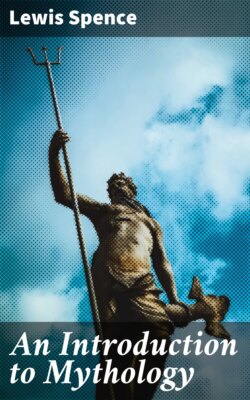Читать книгу An Introduction to Mythology - Lewis Spence - Страница 3
На сайте Литреса книга снята с продажи.
PREFACE
ОглавлениеThis volume is an outline of the principles of mythology, chiefly with reference to its more modern developments. Hand in hand with the sister sciences of folklore and comparative religion, it has advanced so rapidly within the last twenty years and altered so greatly from its ancient aspect that it seems an entirely new science. Thirty years ago, if a student of myth had been asked who Janus was, he would probably have replied: "A Roman god of origins." To-day he might see in him a development of the 'kirn-baby.' So does the study of collected facts and analogies enable us to make broad generalizations. Quite recently, for example, Dr Rendel Harris advanced the theory that Aphrodite was originally a mandrake, while Professor Elliot Smith contends that her 'larval form' was that of the cowrie-shell. Apollo, according to some writers, was originally an apple, Bacchus a sprig of ivy, and Zeus himself a flint-stone fetish.
With such metamorphoses of the elder gods a rather long-suffering public has become somewhat ruefully acquainted. But with the value of the new scientific machinery which has discovered these analogies, which has laid bare the true nature of myth, they are not so intimate. The purpose of this book is to provide them with a review of mythic science from its beginnings down to the latest guesses of contemporary authorities. This plan may appear too ambitious, in the present chaotic condition of the science, but a real necessity exists for some such elementary study in order to cast light into the popular darkness on the subject.
The two great drawbacks of mythology are lack of accepted definitions and of an historical and philosophical review of the subject on popular lines to co-ordinate the results of research. No science can expand without definition, and the definitions here offered have been accepted by most authorities as good working rules, so that, having won the approval of the ablest and most experienced specialists of the day, they may be regarded as an important help to the study of mythology. A useful series of definitions was brought forward with the countenance of the Folklore Society, but the mesh of most of these was far too wide. Seemingly prepared during personal consultation, they suffered in consequence, and the general result was surprisingly inadequate. How different it has been when written opinions have taken the place of verbal discussion may be observed by anyone who cares to compare them with the present series.
The author would note here that he desires to illustrate his theories as far as possible by myths which have come under his own notice and have been collected by himself, not wishing to have directed against him the usual criticism of the mere collector of Märchen, who appears to regard the theoretical writer on mythic science as an arm-chair plagiarist. But he has also used as examples many myths which appear in the several volumes of this series, and is further obliged to the published writings and personal correspondence of the late Mr Andrew Lang, Sir James Frazer, Dr Marett, Mr Sidney Hartland, the late Sir George Laurence Gomme, Professor G. Elliot Smith, and many others. He has to thank Messrs Longmans, Green and Co. for courteous permission to quote from Lang's essay "The Ghastly Priest" in his Magic and Religion.
Lastly, he would plead for a kindly consideration of his own system of mythological elucidation—the eclectic, embracing all he thinks best in other systems, whereas it is the bane of most writers upon mythology and allied subjects that the pride of some one theory is strong in them. If it be asked how one is to be certain of selecting the best from each system, the answer is that one must walk in these caverns by the light of one's own common sense.
It is hoped that the comparative tables will be found of use to students. Much care has been taken in compiling them, but it is not claimed that they are in any way exhaustive.
L.S.
[Books which Mr Spence refers to that are already available at PG are:
Creation Myths of Primitive America by Jeremiah Curtin — http://www.gutenberg.org/ebooks/39106
Folklore as an Historical Science by G. Laurence Gomme — http://www.gutenberg.org/ebooks/21852
The Evolution of the Dragon by George Elliot Smith — http://www.gutenberg.org/ebooks/22038 — mdh]
